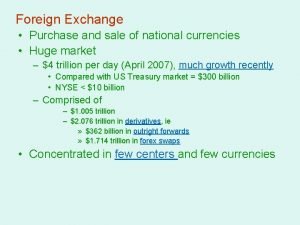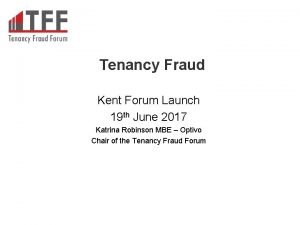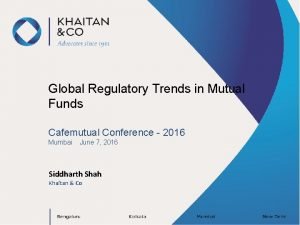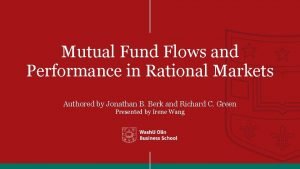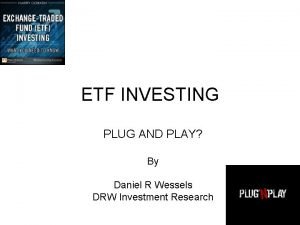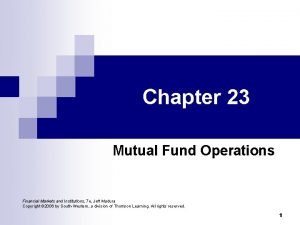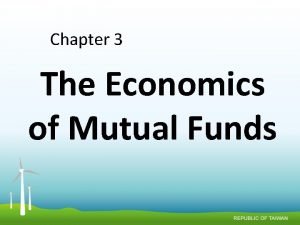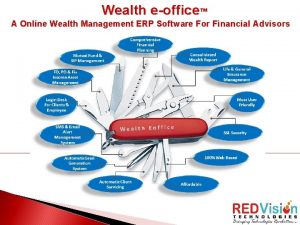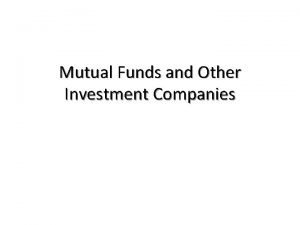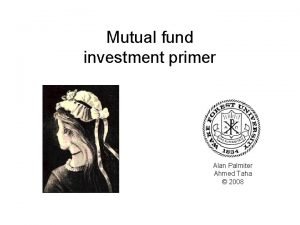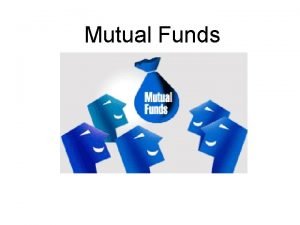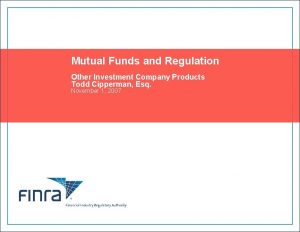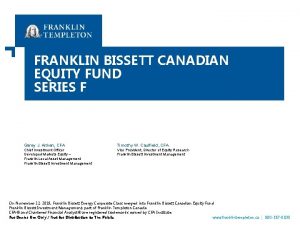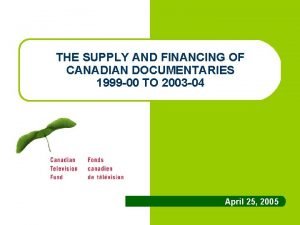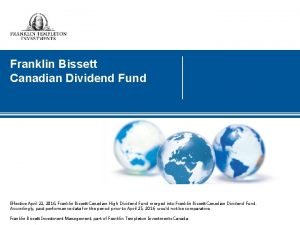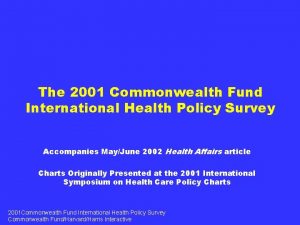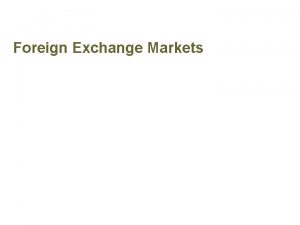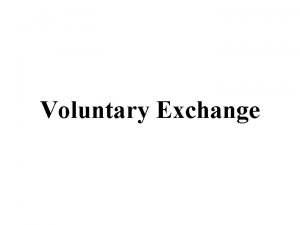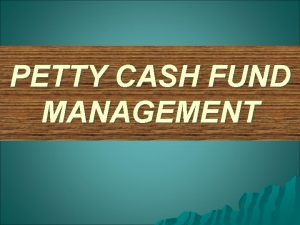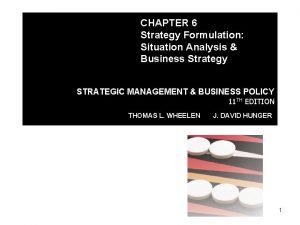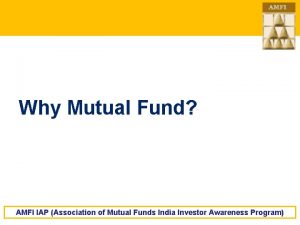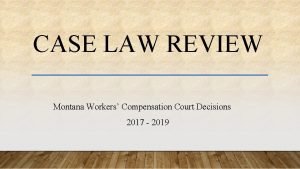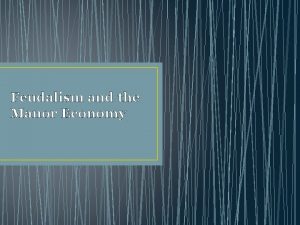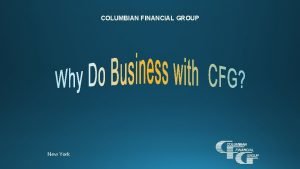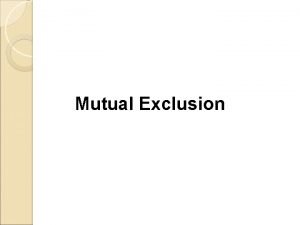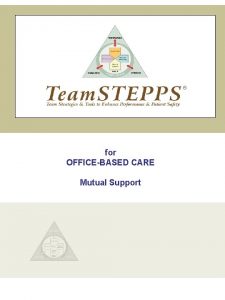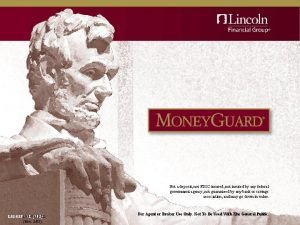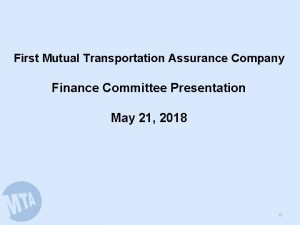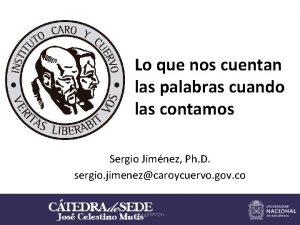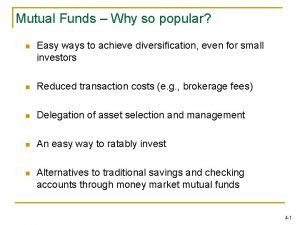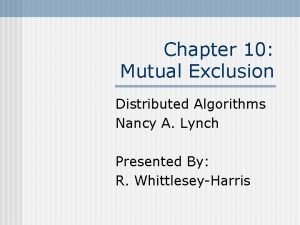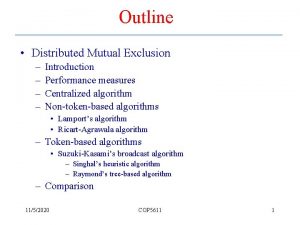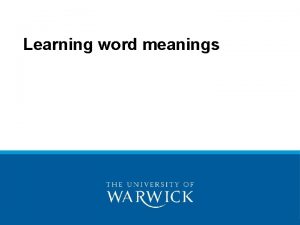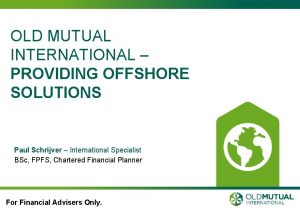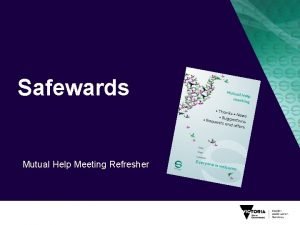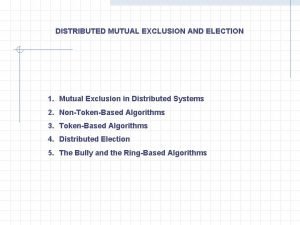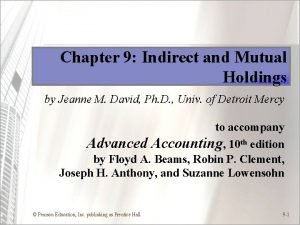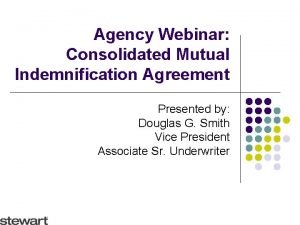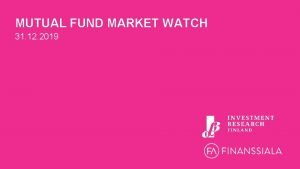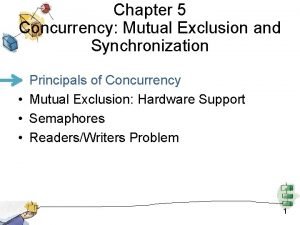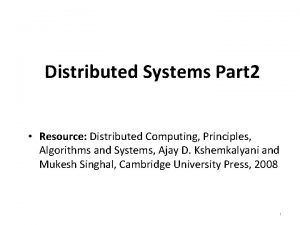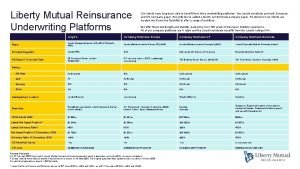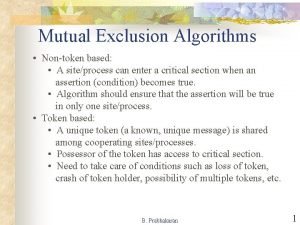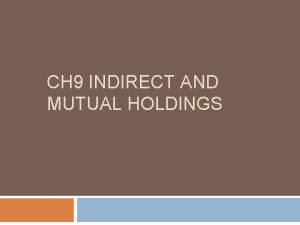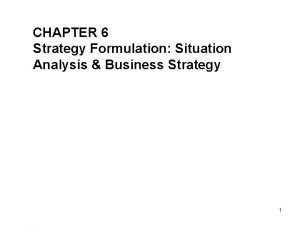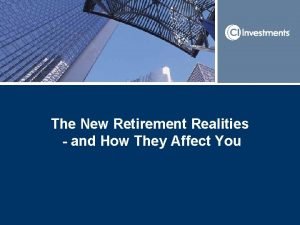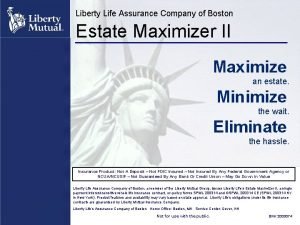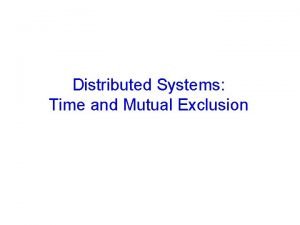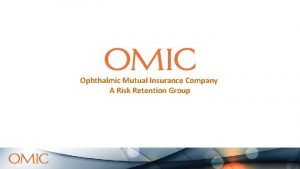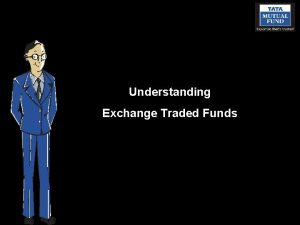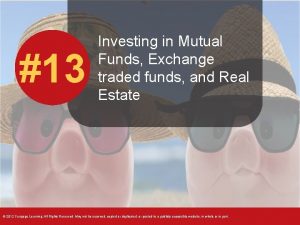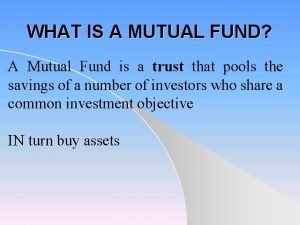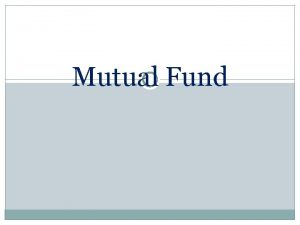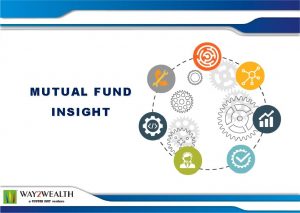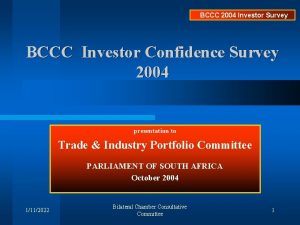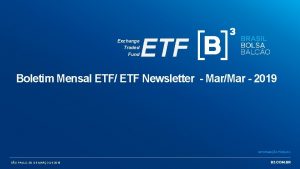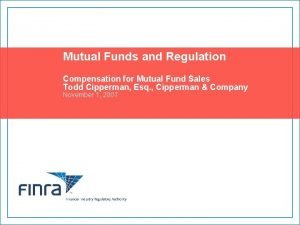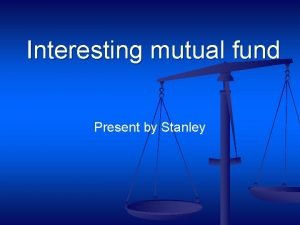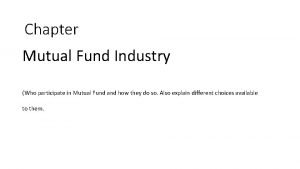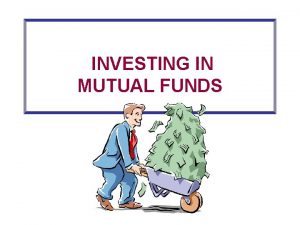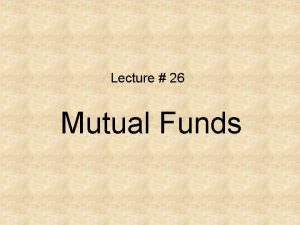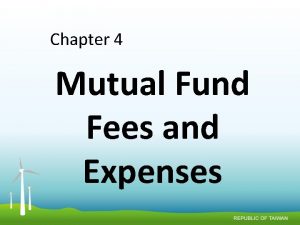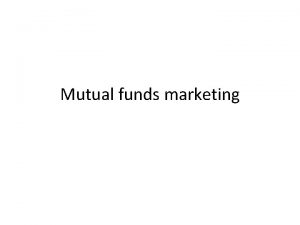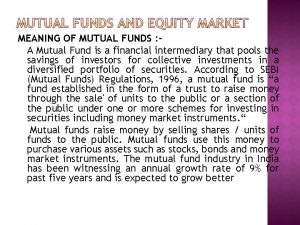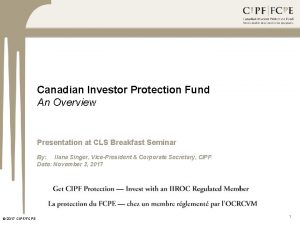Canadian Mutual Fund Exchange Traded Fund Investor Survey












































































- Slides: 76

Canadian Mutual Fund & Exchange. Traded Fund Investor Survey 2019 1

Table of Contents Slide Research Objectives and Methodology 3 Key Findings 7 Results in Detail 16 Attitudes toward Investment Products and Investment Strategies 17 Investment Portfolio and Purchases 24 Assessment of Investment Advisor 30 Attitude towards and Knowledge of Fees 39 Information Requirements and Investment Statements 49 Awareness of and Attitude toward Digital Investment Tools 62 2

Research Objectives and Methodology

Research Objectives • In 2019, the Investment Funds Institute of Canada (IFIC) commissioned Pollara, an independent research firm, to conduct the 14 th wave of IFIC’s annual telephone survey of mutual fund investors in Canada. • This year, the scope of this study was increased to also include Canadian Exchange-Traded Fund (ETF) holders. While in previous research, there were some investors who held both mutual funds and ETFs, this was the first year ETF investors were analyzed as their own group. • The study was initiated by IFIC to better understand Canadian mutual fund holders, and now ETF holders, to identify their attitudes, opinions, needs, expectations and behaviours and to track these over time. • In addition, this survey was designed to provide tracking for impacts on client knowledge and behaviour prior to the introduction of Point-of-Sale and Client Relationship Model Phase 2 regulation. • This research illuminates investor attitudes and behaviour regarding mutual funds and ETFs, including: • • • Confidence in mutual funds/ETFs meeting financial goals; Methods of purchasing mutual funds/ETFs and advisor’s role in decisions; Interest and use of alternative purchase channels; Impressions regarding fees paid for mutual funds/ETFs and advice; The use and perceived value of mutual fund/ETF statements and their changes; and Changes in these measures over the course of the research program. 4

Research Methodology • This research was conducted with Canadian investors who are eighteen years of age or older and who make all or some of the decisions regarding the investments in their household. • Among mutual fund investors, 1, 024 telephone interviews were conducted. These interviews were conducted between May 27 and June 17, 2019. Results with a sample of this size can be considered accurate to within ± 3. 1%, at a 95% level of confidence. • Among ETF investors, 500 telephone interviews were conducted. These interviews were conducted between May 27 and June 28, 2019. Results with a sample of this size can be considered accurate to within ± 4. 4%, at a 95% level of confidence. • National results have been weighted based on 2019 PMB data* to ensure they are representative of mutual fund/ETF holders by region and gender. Interviews were conducted in either English or French, depending on the respondent’s language preference. *Print Measurement Bureau data – annual survey of 36, 000 Canadians which measures use of goods and services. 5

Research Methodology • National results from 2019 mutual fund investors are tracked against results from previous waves of research. Generally speaking, changes of five or fewer percentage points from one year to another are not considered statistically significant and are noted only when they appear to confirm part of an ongoing multi-year trend. Year Sample Size 2019 2018 2017 2016 2015 2014 2013 2012 2011 2010 2009 2008 2007 2006 1, 024 1, 000 1, 008 1, 002 1, 004 1, 000 1, 006 1, 002 1, 895 2, 508 1, 865 Margin of Error ± 3. 1% ± 3. 1% ± 2. 3% ± 2. 0% ± 2. 3% Interview Dates May 27 to Jun. 17, 2019 Jun. 11 to Jul. 6, 2018 Jul. 11 to Jul. 25, 2017 Jun. 29 to Jul. 14, 2016 Jul. 20 to Aug. 10, 2015 Jul. 10 to Aug. 4, 2014 Jun. 23 to Jul. 7, 2013 Jun. 13 to Jul. 2, 2012 Jun. 10 to Jun. 24, 2011 Jun. 11 to Jun. 24, 2010 May 28 to Jun. 9, 2009 May 29 to Jun. 17, 2008 May 23 to Jun. 27, 2007 Jun 15. To Jul. 11, 2006 • Sub-sample results (i. e. , results for different demographic groups) may have a larger margin of error than the overall margins listed above. 6

Key Findings

Key Findings Mutual fund investors continue to have confidence in mutual funds. ETF investors have confidence in a number of products, including mutual funds and ETFs. Attitudes towards Investment Products and Strategies • Mutual fund investors continue to have more confidence in mutual funds than in other investment vehicles (stocks, GICs, bonds and ETFs). – Confidence in mutual funds remains much higher than in other vehicles, with confidence increasing slightly this year. – Confidence in stocks increased this year, while confidence in other products remains consistent to 2018. – Confidence in ETFs among mutual fund investors continues to be low. • While ETF investors have a high confidence in ETFs, they also feel confident in stocks and mutual funds. – Their level of confidence in ETFs is similar to mutual fund investors’ confidence in mutual funds. – Confidence in stocks and mutual funds is as high as confidence in ETFs among these ETF investors. – ETF investors have less confidence in GICs and bonds. 8

Key Findings ETF investors have a more diverse portfolio that is more likely to change compared to mutual fund investors. Investment Portfolios and Purchases • Most investors have more than one type of investment product in their portfolio. – While this is true of mutual fund investors, half of their portfolios are made up of mutual funds, with stocks and GICs also being included. – ETF investors have a more diverse portfolio, consisting of almost an equal amount of ETFs, stocks and mutual funds. – ETF investors are more likely to make changes to their portfolio in the next year. – That said, one-quarter of mutual fund investors plan to increase their ETFs in their portfolios. • Mutual fund purchases have seen a decrease this year, with only one-third of mutual fund investors making a past 12 month purchase, down 9 points over last year. Past 12 month purchases by ETF investors are much higher, with almost half of these investors making a purchase. 9

Key Findings While use of advisors has declined slightly, they continue to be valued and trusted by those who use them. Assessment of Investment Advisor • While mutual fund investors continue to use advisors for the majority of purchases, this has seen a decline of 5 points this year. ETF investors are less likely to rely on advisors, instead purchases are almost evenly split between advisors and online brokerages. • Investors, be it in mutual funds or ETFs, are satisfied with their advisors. – Mutual fund investors continue to see the value in their advisors, would not want to handle their own investments and feel their advisor gives them good savings/investment habits. – While less than half of ETF investors used advisors for their last purchase, those who have agree with these sentiments. That said, they are somewhat less likely to feel they would not want to handle their own investments or that they have better habits because of their advisors. • Advisors continue to discuss the suitability of the investment to meet goals with both mutual fund and ETF investors, with little change seen in this finding over the past 13 years. 10

Key Findings Advisor conversations about fees, in all forms, are on the rise. Confidence in knowledge about fees has also increased. Knowledge of and Attitudes toward Fees • Since the launch of CRM 2, the nature of discussions between advisors and their clients have changed. Almost nine-in-ten investors have had some conversation with their advisors about fees or compensations. Specifically, the greatest increase was seen in discussions about fee/compensation (up 18 points), with discussions about MER increasing by 8 points and fees paid to the firm by 5 points. • ETF investors who use advisors agree that these conversations are happening at the same frequency as mutual fund investors. • Both ETF and mutual fund investors are confident in their knowledge of the fees paid to their advisors, with this confidence increasing for mutual fund investors over last year. – While advisors are a main source of information about fees, investors (particularly ETF investors) use other sources, such as statements to get information. • The majority of mutual fund investors state they do not pay a direct fee. – While mutual fund investors continue to prefer advisors be paid through embedded fees, they are more open to a direct fee than last year. 11

Key Findings Investors continue to become more discerning about the information they are receiving, and are more likely to take action because of it. Information Requirements and Investment Statements • While awareness of Fund Facts has increased since 2016, mutual fund investors are less satisfied with the information they receive when purchasing a mutual fund. • With the launch of CRM 2, a decline in satisfaction with the information contained in annual statements was seen in the 2018 research. This satisfaction has not rebounded this year. Instead, there has been a further softening in the levels of satisfaction with the information contained in these statements. – While overall satisfaction among mutual fund investors has declined only slightly compared to last year’s findings, the proportion who have given statements an excellent rating has decreased significantly. – Impression of statements among ETF investors is similar to that of mutual fund investors, with the exception of the statement’s ability to clearly show fees paid to firm, which receives a higher overall satisfaction among ETF investors. • While still a minority, there has been an increase in the likelihood of taking action due to information contained in the statements. – The likelihood among mutual fund investors has increased by 7 points to almost one-quarter. They are more likely to talk to their advisors than switch advisors or methods of purchase. – ETF investors are even more likely to take action and are more likely to consider investing on their own or using online tools. 12

Key Findings While mutual fund investors continue to have little interest in online tools, ETF investors are likely to use online brokerages. Digital Investment Tools • Among mutual fund investors, awareness of online brokerages has increased but usage has remained the same. Confidence and likelihood to use these tools remains low. • ETF investors are more open to online brokerages, with half having used them. – – These tools are used to purchase stocks and ETFs. Two-thirds of ETF investors feel confident with online brokerages, and are likely to use them in the future. • Behaviours around robo-advisors is similar to that of online brokerages among mutual fund investors, with awareness increasing since last year, but usage staying the same. – Confidence in robo-advisors remains low this year, with likelihood to use among mutual fund investors dropping even lower than that seen in 2018. • ETF investors are less open to using robo-advisors than they are online brokerages. – – Awareness, usage, confidence and likelihood to use are all lower than with online brokerages. While 30% feel confident in robo-advisors, 18% feel it is likely they will use one. 13

Conclusions – Mutual Fund Investors • Mutual fund investors continue to have more confidence in this product than in other products, with this confidence increasing slightly this year. While they are likely to have a variety of products in their investment portfolios, mutual funds are their primary investment vehicle. That said, this could be shifting, with the past 12 month purchase of mutual funds declining, and one-quarter considering an increase of ETFs in their portfolios. • Mutual fund investors continue to rely strongly on advisors; however, there has been a slight decrease in their use this year. Satisfaction with advisors is still very strong and mutual fund investors express a reluctance to manage their investments without them. • Conversations with advisors regarding fees, in all forms, is on the rise. With this rise in conversations has come a rise in confidence in understanding fees and openness to direct fees (although embedded fees are still preferred). • Mutual fund investors continue to become more discerning when it comes to the information contained in their statement. While overall satisfaction with the ease of understanding, providing the necessary information and information on fees and returns has declined slightly compared to last year’s findings, those who give each an excellent rating has declined significantly. There has been a slow increase in the likelihood of investors to take action due to this information over the past two years, but investors are more likely to talk to advisors or switch out specific funds rather than change their method of purchase. • While awareness of online brokerages and robo-advisors is on the rise, there continues to be little interest in these tools. 14

Conclusions – ETF Investors • ETF investors are not as loyal to this investment product. While they are confident in ETFs’ ability to meet goals, they have the same confidence in mutual funds and stocks, and are likely to carry these products in equal amounts in their portfolios. • ETF investors are more likely to have made an investment purchase in the past year, and are more open to changing the diversity of their portfolio moving forward, when compared to mutual fund investors. • These investors are less reliant on advisors; instead, they are much more willing to handle their own investments particularly through the use of online brokerages. While they are aware of robo-advisors, they are not likely to use them. • ETF investors who use an advisor have had discussions about fees, in their different forms, at the same frequency as mutual fund investors. They feel the same level of confidence in their knowledge of fees as do the mutual fund investors. • Levels of satisfaction with annual statements are similar with ETF investors as they are with mutual fund investors, with the exception of the statements’ ability to show fees paid, which is higher among ETF investors. These investors are more likely to take action because of the information in the statements and are more open to handling their investments themselves. 15

Results in Detail

Attitudes towards Investment Products and Strategies

Knowledge About Investing in Mutual Funds Knowledge level in investing in mutual funds has increased over last year. • The proportion who are knowledgeable about investing in mutual funds has increased to 82%, from 76% last year, reaching an all-time high. • This increase was seen more among men, with 86% saying they are knowledgeable, compared to 78% of women. 42% 39% 41% 40% 44% 39% 40% 41% 40% 35% 34% 33% 36% 35% 35% 34% 37% 36% 37% 35% 32% 34% 38% 16% 20% 21% 18% 20% 17% 19% 16% 20% 21% 23% 24% 19% Very knowledgeable (10) Knowledgeable (7 -9) Somewhat knowledgeable (5 -6) Not very knowledgeable (2 -4) Not at all knowledgeable (1) Don't know/Refused 2% 3% 1% 2% 3% 3% 1% 4% 4% 4% 82% 76% 78% 79% 77% 80% 79% 78% 81% 77% 75% Total % Knowledgeable 2019 4% 2% 2018 2017 3% 2016 3% 2015 2% 2% 2014 2013 3% 2% 2012 2011 3% 1% 2010 2009 3% 2008 3% 2007 4% 2006 5% 72% 76% Q 1. Overall, using a scale from 1 to 10 where 1 means you are 'not at all knowledgeable' and 10 means you are 'very knowledgeable', how knowledgeable would you say you are about investing in mutual funds? Base: Mutual Funds N=1024 18

Knowledge About Investing in ETFs Knowledge in ETFs among ETF investors is similar to that of the knowledge mutual fund investors have in mutual funds. • Four-fifths of ETF investors feel at least somewhat knowledgeable about ETFs. This is comparable to the 82% of mutual fund investors who say they have this level of knowledge about mutual funds. • That said, this knowledge is stronger among ETF investors. More than one-tenth (11%) of ETF investors feel very confident in their knowledge about ETFs, compared to only 4% of mutual fund investors that feel very confident about their knowledge about mutual funds. • As with mutual funds, men feel they are more knowledgeable about ETFs than women (85% vs. 73%). Knowledge is similar across age categories. 45% 26% 12% 6% 82% ETF Investors about ETFs 4% 42% 36% 16% 2% 82% Total % Knowledgeable 11% Mutual Fund Investors about mutual funds Very knowledgeable (10) Knowledgeable (7 -9) Somewhat knowledgeable (5 -6) Not very knowledgeable (2 -4) Not at all knowledgeable (1) Don't know/Refused Q 1. Using a 10 point scale, where 1 means 'not at all knowledgeable and 10 means 'very knowledgeable'; how knowledgeable would you say you are about investing in each of the following products? Base: Mutual Funds N=1024, ETFs N=500 19

Confidence in Investment Products Meeting Financial Goals Mutual fund investors continue to have high confidence in these funds. • Mutual fund investors continue to feel more confidence in mutual funds than other types of investments, with confidence increasing slightly this year (91%). Confidence in other investments types also remained stable this year. • Men feel most confident in mutual funds (86% vs. 78% of women). Mutual Fund Investors 4% 2018 5% 2019 3% 2018 3% GICs and other term 2019 deposits 2018 5% 32% 29% 22% 4% 35% 27% 26% Bonds, incl. Canada 2019 Savings Bonds 2018 5% 22% 25% 29% 4% 23% 25% 30% Stocks Exchange-traded 2019 funds 2018 62% 56% 34% 32% 19% 26% 19% Completely confident (10) Not very confident (2 -4) 7% 1% 28% 29% 1% 15% 24% 18% 24% Confident (7 -9) Not at all confident (1) 25% 9% 1% 2% 10% 8% 5% 6% 9% 89% 66% 61% 2% 66% 7% 2% 66% 3% 53% 15% 11% 91% 7% 51% 31% 10% 35% 30% 11% 33% Total % Confident 2019 Mutual Funds Somewhat confident (5 -6) Don't know/Refused Q 3/Q 4/Q 5/Q 6/Q 7. Using a 10 point scale, where 1 means 'not at all confident' and 10 means 'completely confident'; overall, how confident are you that each of the following investment products would help you meet your household's financial goals? Base: Mutual Funds N=1024 20

Confidence in Investment Products Meeting Financial Goals ETF investors have high confidence in ETFs. • Almost nine-in-ten (88%) ETF investors feel confident in ETFs. This is significantly higher than the confidence mutual fund investors have in Mutual ETFs (35%), and is similar to the confidence mutual fund investors feel in mutual funds (91%). Fund • ETF investors also feel a strong confidence in stocks (91%), but are less confident in GICs or bonds. Investors Confidence in primary residence is similar among all investors. • Men feel more confident in ETFs than do women (91% vs. 80% respectively). ETF Investors Mutual Funds Stocks 4% 62% 4% 42% 3% 7% 29% Bonds, incl. Canada Savings Bonds 7% 5% 25% 19% 8% 29% 22% 19% 16% 47% 8% 3% 60% 3% 53% 10% 18% 2% 55% 10% 20% 19% 2% 91% 1% 2% 66% 31% 60% 10% 6% 66% 9% 15% 33% 18% 5% 6% 22% 25% 10% 27% 29% 22% 5%1% 83% 35% 1% 88% 4%6% 11% 4% 4% Completely confident (10) Confident (7 -9) Somewhat confident (5 -6) Not very confident (2 -4) Not at all confident (1) Don't know/Refused Total % Confident 53% 32% 1% 19% 1% 91% 7% 11% 34% 11% 5% Primary Residence 37% 29% GICs and other term deposits Exchange-traded funds 24% 81% Q 3/Q 4/Q 5/Q 6/Q 7. Using a 10 point scale, where 1 means 'not at all confident' and 10 means 'completely confident'; overall, how confident are you that each of the following investment products would help you meet your household's financial goals? Base: Mutual Funds N=1024, ETFs N=500 21

Confidence in Investment Products Meeting Financial Goals Confidence in mutual funds continues to increase among mutual fund investors. • Confidence in mutual funds continues its momentum, increasing to 91% from 89% last year. • After an increase last year, confidence in GICs has leveled out at 66%. • Confidence in stocks, bonds and ETFs have all seen a slight increase. Mutual Fund Investors 100% 90% 80% 70% 60% 85% 78% 71% 63% 54% 50% 40% 30% 20% 84% 83% 62% 64% 72% 72% 58% 55% Mutual funds GICs/term deposits Stocks Bonds (incl. Cda Savings Bond) Exchange-traded funds 28% 2006 2009 2008 67% 60% 59% 57% 55% 2007 78% 80% 68% 64% 63% 58% 59% 57% 31% 2011 2012 81% 65% 61% 57% 85% 64% 55% 87% 86% 62% 64% 61% 55% 33% 34% 2013 2014 2015 85% 65% 89% 66% 91% 66% 59% 51% 59% 43% 36% 37% 2016 2017 61% 51% 33% 53% 35% 26% 2010 2018 2019 Q 3/Q 4/Q 5/Q 6/Q 7. Using a 10 point scale, where 1 means 'not at all confident' and 10 means 'completely confident'; overall, how confident are you that each of the following investment products would help you meet your household's financial goals? Base: Mutual Funds N=1024 22

Confidence in Mutual Funds vs. Primary Residence Confidence in primary residence as an investment saw an increase, lessening the gap between it and mutual funds, among mutual fund investors. Mutual Fund Investors • The gap between confidence in mutual funds and primary residence as an investment has lessened this year, with confidence in housing increasing by 8 points, while confidence in mutual funds increased by only 3 • Confidence in the residence as an investment has increased to levels seen in 2014. • Confidence in housing was similar across age and gender this year. 100% 95% 90% 85% 84% 83% 81% 78% 80% 70% 87% 82% 80% 86% 80% 84% 78% 75% 85% 79% 81% 79% 75% 89% 91% 85% 80% 84% 76% 81% 77% 74% Mutual Funds 65% Your primary residence (added 2007) 60% 2006 2007 2008 2009 2010 2011 2012 2013 2014 2015 2016 2017 2018 2019 Q 3. /Q 8. Using a 10 point scale, where 1 means 'not at all confident' and 10 means 'completely confident'; overall, how confident are you that each of the following investment products would help you meet your household's financial goals? Base: Mutual Funds N=1024 23

Investment Portfolios and Purchases

Investment Portfolio While the majority of mutual fund investors do not have ETFs, the majority of ETF investors have mutual funds. • Most portfolios contain more than one type of investment (portfolios of mutual fund investors 93%, portfolios of ETF investors 99%). • Canadian mutual fund investors are most likely to also have stocks (50%) in their portfolio, with two-fifths also having GICs and other investments. Onethird of these investors have bonds and one-fifth have ETFs. • While the majority of mutual fund investors do not have ETFs, the majority of ETF investors have mutual funds (66%). This group is even more likely to have stocks in their portfolio (82%) with GICs (35%) and bonds (33%) being less popular to this group. Mutual Funds ETFs Mutual Fund Investors ETF Investors Bonds 19% 100% 26% 33% 50% Stocks GICs Other 100% 66% 82% 39% 35% 44% 45% QC. What types of investments do you have? Please consider all that are either part of your RRSP or outside of your RRSP. Base: Mutual Funds N=1024, ETFs N=500 25

Composition of Investment Portfolio ETF investors have a more diverse portfolio than mutual fund investors. Mutual Fund Investors ETF Investors • When asked to describe the amount of each investment type in their portfolio, mutual fund investor portfolios are made up primary of mutual funds (48% of their portfolio on average), with some investments in stocks (16%) and GIC (12%), and a small portion in bonds (5%) or ETFs (5%). In addition, these investors have an average of 14% of their portfolio in something else (other). • ETF investors have a more diverse portfolio, with ETFs only making up an average of 26% of their portfolio. An almost equal proportion of their portfolio is made up of stocks (30%) and mutual funds (25%), with few investing in GICs (7%) or bonds (5%). These investors have 9% of their portfolio in other investments. 4% 15% 18% 36% 11% 43% Stocks 20% 17% 21% 25% 20% 55% GICs and other term deposits 15% 14% <10% -< 24% 25% -< 49% 8% 10% 50% -< 74% 2% 14% 16% 5% 2% 14% 4% 1% 2% 16% 5% 1%14% 4% 1% 16% 9% 23% 16% 9% 15% 71% 34% 12% 13% 64% 14% 7% 11% 66% 14% 12% 14% 65% Bonds, incl. Canada Savings Bonds Exchange-traded funds 28% 8% 75% -< 99% 4%1% 1%14% 5% 16% 48 25 16 30 12 7 5 5 5 26 Average % of each investment in portfolio Mutual Funds Don't know Q 9. You mentioned that you have more than one type of investment. What percentage of your investment portfolio is made up of. . . and how about. . . ? Base: Those with more than one investment type: Mutual Funds N=955, ETFs N=497 26

Future Changes to Investment Portfolio ETF investors are more likely to change their portfolio composition in the next year. Mutual Fund Investors ETF Investors • Mutual fund investors are most likely to keep their portfolio as is, with more than half planning on keeping their mutual fund and ETF investments consistent over the next year (56% and 50% respectively). That said, 28% may increase their ETFs and 23% may increase their mutual fund investing. • ETF investors are more open to change, with half saying they will keep their ETFs (52%) and mutual funds (53%) the same. They are more likely to increase their ETFs (35%) than their mutual funds (26%). • 18 -44 year olds are more likely to increase ETF investments (mutual fund investors 42%, ETF investors 55%). Future ETFs Activity Significantly increase the ETFs in portfolio Don't know Moderately increase Mutual Funds 25% 32% 56% 52% Keep the ETFs the same Significantly decrease ETFs in portfolio Significantly increase the 3% Mutual Funds in portfolio 0% 3% 3% Moderately increase ETFs Moderately decrease ETFs Future Mutual Funds Activity 8% 8% 1% 1% 20% 26% Keep the Mutual Funds the same Moderately decrease Mutual Funds Significantly decrease Mutual Funds in portfolio 7% 5% Q 10. In the next year, which of the following do you expect to do? Base: More than one type of investment Mutual Funds N=893, ETFs N=497 Don't know 60% 53% 10% 14% 2% 2% 5% 5% 27

Most Recent New Fund Purchase The past year purchases of mutual funds have decreased. • Just over half (53%) of mutual fund investors have purchased a fund in the past two years, compared to 60% in 2018 and 59% in 2017. However, the proportion that has made a purchase in the past year has decreased from 44% last year to 35% this year. • Those 65 and older are least likely to have made a purchase in the past two years (45% vs. 52% of 45 -64 year olds and 60% of those 18 -44) Mutual Fund Investors 2019 2018 2017 35% 44% 37% 2015 36% 2009 43% 40% 20% 16% 39% 2016 2012 18% 15% 20% 22% 19% 17% 19% Less than 12 months ago 1 to <2 years ago 5+ years ago Don't know/Refused 23% 20% 18% 15% 23% 4% 3% 18% 3% 19% 3% 24% 6% 17% 21% 2% 20% 17% 4% 2 to <5 years ago Q 21. When was the last time you purchased a mutual fund that you did not already own, either as part of your RRSP or outside of your RRSP? Base: Mutual Funds N=1024 28

Most Recent New Fund Purchase Two-thirds of ETF investors have purchased a fund in the past two years. ETF Investors • ETF investors are more likely to have made a recent purchase of ETFs, with 67% having done so in the past two years, 46% in the past year. Of this investor group that also owns mutual funds, they are likely to have done so at the same frequency, with 62% having purchased a mutual fund in the past two years, while 46% had done so in the past year. • This compares to 53% of mutual fund investors who have purchased mutual funds in the past two years. • These purchases are more likely to have been made by 18 -44 year olds (73%) than 45 -64 year olds (64%) or 65 and older (59%). 46% 17% 17% 3% Mutual Fund Purchased 46% 21% 17% 11% 4% ETF Purchased Less than 12 months ago 1 to <2 years ago 5+ years ago Don't know/Refused 2 to <5 years ago Q 22. When was the last time you purchased an Mutual Fund/ ETF that you did not already own, either as part of your RRSP or outside of your RRSP? Base: ETF investors n=500, ETF investors that have mutual funds n=330 29

Assessments of Investment Advisor

Methods of Purchasing Mutual Funds: Most Recent Purchase Likelihood of using an advisor to purchase mutual funds is down slightly. Mutual Fund Investors • The vast majority of people who purchase mutual funds continue to do so through an advisor (80%); however, this is down from the 85% who used an advisor last year. • Those purchasing funds in another way has increased to 20% from 13% last year, with 7% doing so through an online brokerage and 13% in another. No one had made their last purchase through a robo-advisor. 100% 90% 85% 83% 70% 81% 83% 85% 60% Purchase them from an advisor 50% Purchase them online or from a customer service rep Don't know/Refused 40% 87% 13% 11% 2% 2% 2% 1% 2% 2011 2012 2013 2014 2015 2016 2017 81% 87% 90% 85% 84% 85% 13% 80% 30% 20% 11% 4% 15% 4% 3% 3% 2007 2008 2009 14% 17% 10% 5% 14% 9% 2% 20% 0% 0% 2006 2010 Q 24. For the next few questions I would like you to think about the last time you invested in a mutual fund. When buying those mutual funds did you. . . ? Base: Mutual Funds N=1024 2018 2019 31

Most Recent New Fund Purchase ETF investors are more likely to have purchased ETFs without an advisor. • The method of purchasing ETFs is split between those who use an advisor (46%) and those who use an online brokerage (41%). In comparison to how the mutual fund investors purchase mutual funds, ETF purchases are much less likely to be made through advisors. • Those who are knowledgeable about ETFs are more likely to use an online brokerage (56%), although one-third (34%) made their last purchase through an advisor. • Online brokerages are also more popular among 18 -44 year olds (51%) and men (46%) when it comes to ETF purchases. 46% 1% 41% 10% 1% ETF Investors Advisor Robo-advisor Online brokerage Another way Don't Know/Can't Recall Q 25. The last time you purchased this investment, did you purchase from someone who provided you with advice and guidance, through robo-advisor, through a discount brokerage or direct investing or in another way. Base: Mutual Funds N=1024, ETFs N=500 32

Satisfaction with Advisor’s Advice Mutual Fund investors continue to be satisfied with their advisors. Mutual Fund Investors • The vast majority of mutual fund investors with an advisor report some level of satisfaction with this individual, with these results being consistent over the past decade. • Satisfaction increases with age, with those 18 -44 being less likely to say they are “completely satisfied” or “satisfied” (73%). Women are more likely to be completely satisfied with their advisor (31% vs. 18% of men). 24% 57% 16% 2% 1% 96% 24% 57% 14% 4% 1% 95% 1% 4% 1% 94% 2% 1% 97% 1% 4% 2% 93% 1% 3% 0% 96% 1% 4% 1% 94% 5%2% 92% 4% 2% 93% 22% 56% 16% 28% 58% 25% 59% 26% 20% 19% 20% 23% 11% 9% 60% 10% 63% 11% 59% 14% 62% 11% 58% 55% 25% 13% 6% 1% 3% 91% 12% 8% 1% 2% 90% 1% 4% 1% 93% 58% 10% Completely satisfied (10) Satisfied (7 -9) Somewhat satisfied (5 -6) Not very satisfied (2 -4) Not at all satisfied (1) Don't know/Refused Total % Satisfaction 2019 2018 2017 2016 2015 2014 2013 2012 2011 2010 2009 2008 Q 33. I would now like to ask you about your relationship with your financial advisor - meaning the advisor who you buy your mutual funds from. Using a scale from 1 to 10 where 1 means 'not at all satisfied' and 10 means 'completely satisfied', how satisfied are you with the advice provided by your financial advisor? Base - Purchased mutual funds from advisor: Mutual Funds N=707 33

Satisfaction with Advisor’s Advice ETF investors also report high satisfaction with their advisors. • ETF investors also report high satisfaction with their advisors, with almost all (99%) giving them a positive rating. • One-third (31%) say they are completely satisfied with the advisor, which is higher than the proportion of mutual investors who feel the same (24%). • As with mutual fund investors, satisfaction increases with age, with those 18 -44 being least likely to say they are “completely satisfied” or “satisfied” (86%) and women giving their investor a rating of 10 (45%) compared to men (24%). 57% 16% 2% 96% 1% Mutual Fund Investors 31% 60% 8% 1% 99% Total % Satisfaction 24% ETF Investors Completely satisfied (10) Satisfied (7 -9) Somewhat satisfied (5 -6) Not very satisfied (2 -4) Not at all satisfied (1) Don't know/Refused Q 34. I would now like to ask you about your relationship with the advisor who you buy your ETFs from. Using a scale from 1 to 10 where 1 means 'not at all satisfied' and 10 means 'completely satisfied', how satisfied are you with the advice provided by your financial advisor? Base – Combination of MF/ETF Advisors: Mutual Funds N=844, ETFs N=285 34

Advisor Trust Mutual fund investors feel their advisors add value. Mutual Fund Investors • More than four-fifths (85%) of mutual fund investors agree that the advice they get is worth the fees, which is similar to the 84% who said the same last year. • Additionally, they would not want to handle their investments on their own (88%), which is similar to last year’s findings. That said, 58% strongly agree with this statement, which is up from the 52% who felt the same last year. 2019 37% 2018 37% I would not want to handle my investment on my own 2019 2018 1% 10% 3% 48% 47% 58% 9% 30% 52% 33% Strongly agree Somewhat agree Strongly disagree Don't know/Refused 9% 10% 85% 4% 4% 88% 1% 5% 85% Total % in Agreement Advice provided by my financial advisor is worth the fees Somewhat disagree Q 36/37. To what extent do you agree or disagree with the following statements about financial advisors? Base - Purchased mutual funds from advisor: Mutual Funds N=844 35

Advisor Trust Advisors continue to promote better investing habits. • Four-fifths (80%) of mutual fund investors say their advisor provides them with better savings habits, an increase from 78% last year. Mutual Fund Investors 38% 42% 12% 6% 3% 80% 2018 38% 40% 14% 2% 6% 78% 2017 37% 41% 13% 1% 8% 78% 2016 38% 6% 1% 82% 44% Strongly agree Somewhat agree Strongly disagree Don't know/Refused 11% Total % in Agreement Because of my advisor, I have better saving and investment habits 2019 Somewhat disagree Q 38. To what extent do you agree or disagree with the following statements about financial advisors? Base - Purchased mutual funds from advisor: Mutual Funds N=844 36

Advisor Trust ETF investors also value and trust their advisors. Mutual Fund Investors ETF Investors • The majority of ETF investors agree their advisors provide advice that is worth the fees, that they wouldn’t want to handle their investments alone and that they have better habits due to their advisors. While they are less likely than mutual fund investors to say they wouldn’t want to handle investments on their own, they feel more strongly in the value of the advice. • While those with knowledge of ETFs value the advice they receive (93%), they are less likely to agree they wouldn’t want to handle investments on their own (76%) or that they have better habits (67%). • Agreement to all statements increases as the investor ages. 37% 41% 1% 87% 46% 30% 51% 38% 36% 30% Strongly agree Somewhat agree Strongly disagree Don't know/Refused 12% 13% 4% 88% 9% 11% 42% 35% 1% 3% 85% 10% 58% I would not want to handle my investment on my own Because of my advisor, I have better saving and investment habits 48% 9% 9% 81% 6% 3% 80% 7% Total % in Agreement Advice provided by my financial advisor is worth the fees 71% Somewhat disagree Q 36/37/38. To what extent do you agree or disagree with the following statements about financial advisors? Base - Purchased mutual funds from advisor: Mutual Funds N=844, ETFs N=331 37

Whether Advisor Discussed Suitability Most advisors discuss the suitability of a mutual fund with investors. • Investors report that most advisors will talk to them about how mutual funds will help meet their goals. This has remained constant over the past decade. • This is notably higher among those knowledgeable about mutual funds (94%) than those who consider themselves not knowledgeable (89%). Mutual Fund Investors 100% 90% 88% 87% 85% 88% 89% 89% 90% 92% 90% 89% 90% 91% 11% 9% 10% 9% 9% 7% 8% 6% 8% 7% 70% 60% Yes 50% No 40% Don't know/Refused 30% 20% 10% 0% 7% 2% 2006 10% 2% 2007 10% 2% 2008 13% 2% 2009 2% 2010 2% 2011 1% 2012 2% 2013 2% 2014 1% 2015 1% 4% 2016 Q 29. Thinking back to the last time you invested in mutual funds, did your advisor: Discuss how well suited that mutual fund is for reaching your investment objectives? Base: Purchased mutual funds from advisor N=844 2017 2% 2018 2% 2019 38

Attitudes Towards and Knowledge of Fees

Whether Advisor Discussed Compensation/Fees/MER There has been an increase in conversations about fees/compensation. Mutual Fund Investors • Almost nine-in-ten (88%) have had a discussion with their advisor about at least one of these three fee topics, while 49% had the conversation about all three. • Three-quarters of those purchasing mutual funds from an advisor say the advisor had talked to them about fees. This is a significant increase from the 58% who had this conversation last year and the 64% who had it at the start of CRM 2 in 2017. • There has also been an increase in those who have had a conversation about MER (from 59% last year and 56% in 3017 to 67% this year) and fees paid to the firm (from 58% last year and 52% in 2017 to 63%). 100% Discussed fees / commissions * Discussed MER (added 2008) Discussed fee paid to firm (added 2015) 90% 80% 69% 63% 70% 60% 52% 50% 58% 50% 62% 53% 64% 54% 63% 55% 62% 55% 60% 56% 62% 56% 57% 56% 53% 47% 40% 64% 49% 52% 2016 2017 76% 59% 58% 67% 63% 30% 2006 2007 2008 2009 2010 2011 2012 2013 2014 2015 2018 2019 * Wording has changed from Discuss whether or not you will be charged a sales commission when you buy or sell the mutual fund – also called ‘front-end load’ and ‘back-end load’ fees in 2018 to Discuss whether or not your will be charged any fees when buying or selling your mutual fund. This can be called a front-end or back-end load or a trading fee in 2019 Q 30 -Q 32. Thinking back to the last time you invested in mutual funds, did your advisor: Discuss whether or not you will be charged any fees when buying or selling your mutual fund/ ETF/ mutual fund or ETF. This can be called a front-end or back-end load or a trading fee? Discuss the fee the mutual fund / ETF / mutual fund or ETF company receives for managing, distributing and administering the fund, also known as the Management Expense Ratio or the MER? Discuss the fee paid to the firm where your advisor works? Base - Purchased mutual funds from advisor: Mutual Funds N=844 40

Whether Advisor Discussed… Advisor conversations are the same, regardless of investment product. • The likelihood of advisors covering a number of topics in their conversations is the same among mutual fund and ETF investors. • Three-quarters of both types of investors having discussions about buying selling fees and two-thirds about MER and advisory firm fees. Almost all report having a discussion about the suitability of the investment. Discussed Suitability Buying/Selling Fees MER Advisory Firm Fees 91% 7% 1% 76% 21% 3% 67% 28% 5% 90% 9% 1% 77% 21% 1% 71% 28% 1% 63% 32% 5% Mutual Fund Investors 69% 30% 1% ETF Investors Q 29 - Q 32. Thinking back to the last time you invested in ETFs, did your advisor: Discuss how well suited that ETF is for reaching your investment objectives? Discuss whether or not you will be charged any fees when buying or selling your mutual fund/ ETF/ mutual fund or ETF. This can be called a front-end or back-end load or a trading fee? Discuss the fee the mutual fund / ETF / 41 mutual fund or ETF company receives for managing, distributing and administering the fund, also known as the Management Expense Ratio or the MER? Discuss the fee paid to the firm where

Confidence in Knowledge of Fee Payments Confidence in fees paid has increased among mutual fund investors. Mutual Fund Investors • More than four-fifths (84%) of mutual fund investors are confident in their knowledge of the fees they pay. This is an all-time high and a significant increase compared to the 73% who had the same confidence last year and the 66% who had it at the start of CRM 2 in 2017. Specifically, those who feel very confident or confident has increased by 11 -points over last year. • Those who are knowledgeable about mutual funds are more likely to feel confident in their knowledge of fees (95%). 2019 15% 13% 2017 12% 2016 2015 2014 2013 2012 2011 2010 36% 18% 33% 13% 37% 15% 12% 22% 39% 40% 15% 11% 15% 23% 38% 43% 16% 19% 22% 18% 84% 9% 1% 73% 9% 5% 66% 3% 70% 1% 73% 11% 4% 70% 9% 3% 73% 11% 2% 72% 14% 10% 2% 74% 16% 10% 1% 72% 17% 20% 37% 16% 19% 21% 1% 3% 13% 24% 36% 10% 23% 15% Very confident (10) Confident (7 -9) Somewhat confident (5 -6) Not very confident (2 -4) Not at all confident (1) Don't know/Refused 9% Q 39. Now I’d like to ask you a question about any fees and/or commissions you pay for your mutual funds. Overall, using a scale from 1 to 10 where 1 means you are 'not at all confident' and 10 means you are 'very confident', how confident are you about your knowledge of any fees and/or commissions you pay for your mutual funds? Base: Mutual Funds N=1024 Total % Confident 2018 45% 42

Confidence in Knowledge of Fee Payments ETF investors are also very confident in their knowledge of the fees they pay. • As with mutual fund investors, more than four-fifths (84%) of ETF investors are confident in their knowledge of the fees they pay. • ETF investors are more likely than mutual fund investors to say they are very confident (32% vs. 15%). • Younger investors are more likely to say they are very confident (37%) than are 45 -64 year olds (29%) or those 65 and older (27%). 45% 23% 1% 3% 84% 1% 2% 84% Mutual Fund Investors 32% 39% 15% 11% Total % Confident 15% ETF Investors Very confident (10) Confident (7 -9) Somewhat confident (5 -6) Not very confident (2 -4) Not at all confident (1) Don't know/Refused Q 39. Now I’d like to ask you a question about any fees and/or commissions you pay for your mutual funds/ ETFs. Overall, using a scale from 1 to 10 where 1 means you are 'not at all confident' and 10 means you are 'very confident', how confident are you about your knowledge of any fees and/or commissions you pay for your mutual funds/ETFs? Base: Mutual Funds N=1024, ETFs N=500 43

Sources of Information about Fees Mutual fund investors are more likely to get information from advisors. • Mutual fund investors obtain information about fees from their advisors (60%) or to a slightly less degree, their statements (53%). Those who are knowledgeable about mutual funds are less likely to rely on advisors (53%) and more on their statements (55%). Older investors are more likely to rely on advisors (45 -64 61%, 65+ 67%). • ETF investors get their information from a number of sources, with 49% naming advisors, 46% their statement and 44% a different source. Those who are knowledgeable about ETFs are more likely to use another sources (58%) and less likely to depend on advisors or statements (39% each). Younger investors (60%) and men (51%) are also more likely to rely on other sources. 60% From your advisor Mutual Fund Investors ETF Investors 49% 53% 46% From your statement 20% From another source 44% Not sure 1% 0% Don't have knowledge 1% 0% Q 40/42. From where do you get your knowledge about the fees and/or commissions you pay for your Mutual Funds/ETFs? Base: Mutual Funds N=1024, ETFs N=500 44

Advisor Compensation Structure Four-fifths of mutual fund investors believe they pay a trailer to their advisors. Mutual Fund Investors • The belief of the compensation structure for mutual fund purchases to pay their advisor continues its slow growth, up 2% since last year and 9% since 2016. • Among those who are knowledgeable about mutual funds, 41% are certain in their knowledge. • 18 -44 year olds (24%) and women (22%) are less certain in this knowledge. 2019 32% 30% 2017 30% 2016 2015 2014 2013 27% 23% 27% 25% 11% 49% 11% 48% 45% 46% 43% 44% Yes, definitely Yes, I think so No, definitely not Don't know/Refused 16% 3% 6% 79% 78% 8% 72% 5% 10% 69% 6% 7% 70% 8% 16% 81% 2% 9% 11% 13% 6% 2% 7% 9% Total % Yes 2018 49% 69% No, I don't think so Q 44. As far as you know, is part of the fees charged within the mutual funds you invest in used to compensate your financial advisor or your advisor's firm? Would you say. . ? Base - Purchased mutual funds from advisor: Mutual Funds N=844 45

Direct Fee Payments Over one-in-ten mutual fund investors pay a direct fee to their advisor/firm. • The number of mutual fund investors who state they pay a direct fee has remained constant, at 14% this year compared to 13% last year. • Those 65 and older are more likely to state they pay a direct fee (23%) compared to 18 -44 year olds (8%). Mutual Fund Investors 3% 8% 3% 2018 2%9% 2% 2017 3% 11% 2016 4% 7% 3% 5% 3% 14% 4% 13% 79% 4% 17% 82% 3% 16% 84% 83% 2015 5% 7% 5% 80% 4% 17% 2014 5% 6% 4% 82% 2% 15% 2013 5% 6% 2% 2% 13% 85% Yes, I pay a fee directly to my advisor Yes, I pay a fee to the firm where my advisor works Yes, I pay a fee directly but unsure to whom No, I do not pay a fee directly Total % Yes 2019 Don't know/Refused Q 45. Do you pay any fees directly to your advisor for the services you receive? Base - Purchased mutual funds from advisor: Mutual Funds N=844 46

Compensation Model Preferences Preference for payment through mutual fund fees decreases slightly. • The majority of investors with advisors continue to prefer that their advisor be paid through mutual funds fees. This proportion has decreased from 59% last year to 52% this year – back to 2017 levels. • Results are similar across all demographic groups. Mutual Fund Investors 2019 52% 2018 40% 59% 7% 33% 7% 2017 53% 37% 9% 2016 54% 37% 9% 2015 51% 2014 54% 2013 51% 37% 12% 38% 41% 8% 9% I prefer that my advisor is paid through mutual fund fees that reduce my investment returns. I prefer to be charged a fee for ongoing advisory services directly by my advisor. Don't know Q 46. Which of the following two statements comes closest to your own personal preference on how your advisor is paid? Base - Purchased mutual funds from advisor: Mutual Funds N=844 47

Compensation Model Preferences ETF investors are split on their preferred compensation model. • An almost equal proportion of ETF investors would prefer their advisors be paid through fees (47%) and be charged an ongoing fee (46%). This group is more open to a direct fee than are mutual fund investors. • Those 65 and older would prefer a direct fee (56%), whereas 45 -64 year olds would prefer it come from fees (53%). 18 -44 year olds are more split on their views. 47% 46% 7% ETF Investors I prefer that my advisor is paid through fees that reduce my investment returns. I prefer to be charged a fee for ongoing advisory services directly by my advisor. Don't know Q 46. Which of the following two statements comes closest to your own personal preference on how your advisor is paid? Base - Purchased mutual funds from advisor: Mutual Funds N=844 , ETFs N=331 48

Information Requirements and Investment Statements

Recall Receiving Information Materials About New Mutual Fund Purchased More than four-fifths recall receiving informational materials such as Fund Facts. • More than four-fifths of mutual fund purchasers recall receiving Fund Facts, an increase of 14 points since this was last tested in 2016. • Those who are knowledgeable about mutual funds are more likely to state they received informational material such as Fund Facts (89%). • Younger investors are more likely to recall receiving this information (93%) compared to 45 -64 year olds (83%) or 65 and older (76%). Mutual Fund Investors 2019 85% 2016 71% 2015 72% Yes No 12%3% 22% 26% 7% 2% Don't know Q 27. When you last purchased a mutual fund, do you recall receiving any information materials such as Fund Facts about the new mutual fund you purchased? Base: Mutual Funds N=1024 50

Quality of Information Materials Received About New Mutual Fund Purchased Satisfaction on materials regarding new mutual fund purchases has decreased slightly. Mutual Fund Investors • Mutual fund investors continue to be more discerning about the information contained in the Fund Facts since the launch of CRM 2. They are less likely to consider the information they receive to be complete, with 86% giving this a positive rating, compared to 92% in 2016. • When it comes to the ease of understanding the information, satisfaction has declined from 87% giving it a positive rating in 2016 to 79% this year. • While the vast majority believe this clearly shows the fund’s historical rate of return (88%), this is down from 94% when last testing is 2015. 2019 15% 2015 2019 The information was 2016 easy to understand 2015 Clearly showed fund's historical rate of return 21% 56% 24% 47% 9% 15% Excellent (10) 96% 1% 4% 79% 1% 3% 87% 1% 5% 93% 4%4%4% 88% 0% 5% 1% 94% 10% 15% 59% Fair (5 -6) 4% 19% 43% Good (7 -9) 92% 11% 59% 15% 1% 4%4% 16% 22% 30% 86% 16% 23% 56% 4%4% 6% 56% 10% 2019 2015 49% 19% Poor (2 -4) Very poor (1) Total % Satisfactory It provided me with all the information I 2016 felt I needed Don't know Q 28. Using a scale from 1 to 10 where 1 means 'very poor' and 10 means 'excellent', please rate the quality of the information materials you received about your new mutual fund purchase in each of the following areas. Base: Mutual Funds N=1024 51

Form of Mutual Fund Account Statements Received Paper statements for mutual fund accounts continue to be most popular. Mutual Fund Investors • Almost all mutual fund investors recall receiving statements of their accounts, with only 3% saying this has not been received. • While 41% of mutual fund advisors continue to receive paper only statements, this has declined by 10 points since the start of testing in 2016. Conversely, the number of mutual fund investors receiving only electronic statements has increased by 8 points to 24%. • Those 18 -44 are less likely to receive paper only statements (33%) and are more likely to receive them electronically (32%). 41% 49% 51% Paper statements 24% 18% 16% Electronic statements 32% 31% 29% 33% Both paper and electronic statements Do not receive statements 2019 2018 2017 2016 3% 2% 2% 1% Q 48. In what form do you receive statements regarding your mutual fund accounts? Base: Mutual Funds N=1024 52

Form of Mutual Fund Account Statements Received Electronic statements are most popular for ETF investors. Mutual Fund Investors ETF Investors • Most ETF investors also recall receiving statements for their accounts, with only 6% saying it was not received. • One-third (38%) of ETF investors receiving only electronic statements, while 26% receive both paper and electronic. Only 29% rely on paper statements alone. • Those 65+ are most likely to get paper statements only (41%) whereas 18 -44 year olds are more likely to depend solely on electronic statements (48%). • Women are also more likely to get paper statements (43%) whereas men are more likely to get electronic (43%). 41% Paper statements 29% 24% Electronic statements 38% 32% Both paper and electronic statements Do not receive statements 26% 3% 6% Q 48. In what form do you receive statements regarding your mutual fund accounts? Base: Mutual Funds N=1024, ETFs N=500 53

Form of Mutual Fund Account Statements Received Most investors read their statements. • A vast majority of investors, regardless of the product they are investing in, will read their statements when they are received. 80% 81% Read it Filed it without reading it Mutual Fund Investors ETF Investors 11% 7% Gave it to someone else in the household to read 4% 4% Deleted it or threw it out without reading it 3% 5% Other 1% 2% Don't know 0% 1% 54 Q 49. Which of the following best described what you usually do with the mutual fund /ETFs / investment statements you receive? Base: Mutual Funds N=1024, ETFs N=500

Recall/Reading Fee and Performance (CRM 2) Statement While investors recall receiving their annual fee and performance (CRM 2) statement this year, ETF investors are more likely to have read it. • The majority of all investors recall receiving and reading their statements this year. • While three-quarters of both mutual fund (74%) and ETF (75%) investors recall receiving their CRM 2 statements, of these, ETF investors are more likely to have read it (71%) than mutual fund investors (63%). This means, of the total group, 47% of mutual fund investors and 53% of ETF investors recall reading this year’s annual statement. • Those with knowledge about their funds are more likely to have read the statement (71% for mutual funds, 77% for ETFs). Recall Receiving Statements 74% Read Statements 23% 4% 63% 34% 2% Mutual Fund Investors 75% 24% 1% 71% 27% 2% ETF Investors Q 50. Do you recall receiving annual fees and performance statement/(s) for your investments this year? Q 51. Have you read the annual fees and performance statement/(s) that you received for your investments this year? Base: Mutual Funds N=1024, ETFs N=500 55

Rating of Annual Statement Satisfaction with statements declined slightly this year, adding to the significant decline in 2018. • While mutual fund investors continue to feel positively about their statements, satisfaction has dropped slightly, compared to last year, with scores being significantly lower than what was seen in 2017. • Despite the only slightly less positive overall scores this year compared to last, investors are feeling less strongly about the statements, being more likely to give each of these factors a “good” rather than an excellent rating this year. This is true for all factors. Mutual Fund Investors The information in the statement was easy to understand Clearly showed the fees I pay to my advisor’s firm or dealer’s firm Clearly showed the rate of return on my account 17% 50% 31% 18% 41% 22% 8% 5% 1% 17% 6% 60% 21% 13% 52% 12% 44% 30% 52% 18% 31% 29% 19% 31% 33% 16% 14% 10% 8% 15% 47% 8% 11% 29% 39% 0% 82% 6%1% 11% 49% 12% 53% 15% 10% 55% 73% 4%5%2% 74% 11% 24% 0% 82% 4% 1% 9% 4%1% 15% 67% 2% 72% 3% 47% 5% 50% 7% 2% 1% 80% 1% 2% 84% 2% Total % Good/Excellent Provided me with all the information I needed 2019 2018 2017 10% 8% Excellent (10) Good (7 -9) Neutral (5 -6) Poor (2 -4) Very poor (1) Don't know/Refused 1% 86% 4% 1% Q 48 - Q 51 Using a scale from 1 to 10 where 1 means 'very poor' and 10 means 'excellent', please rate the quality of the information you received in your annual fees and performance statement/(s) about your investments in each of the following areas. Base: Mutual Funds N=1024 56

Quality of Information Materials ETF investors feel somewhat more confident about the ease of understanding and information about fees. Mutual Fund Investors ETF Investors • ETF investors feel similarly to mutual fund investors when it comes to being provided with the information they need, being shown the rate of return on the account. • However, ETF investors feel somewhat more positive than mutual fund investors when it comes to the ease of understanding the statements and that the statement shows the fees paid. Provided me with all the information I needed Clearly showed the fees I pay to my advisor’s firm or dealer’s firm Clearly showed the rate of return on my account 17% 50% 17% 18% 56% 21% 12% 47% 18% 31% 21% 36% Excellent (10) Poor (2 -4) 7% 3% 1% 73% 9% 4%1% 73% 8% 4% 2% 71% 15% 21% 35% 33% 67% 15% 52% 24% 8% 5% 1% 16% 47% 46% Good (7 -9) Very poor (1) 10% 8% 5% 11% 13% 48% 56% 10% 7% 2% 1% 80% 9% 2% 7% 2% 82% Total % Good/Excellent The information in the statement was easy to understand Neutral (5 -6) Don't know/Refused Q 52 – Q 55. Using a scale from 1 to 10 where 1 means 'very poor' and 10 means 'excellent', please rate the quality of the information materials you received about your investments in each of the following areas. Base: those who recall receiving their annual statement for mutual fund account this year Base: Mutual Funds N=1024, ETFs N=500 57

Action Taken Due to Changes The new information in statements has caused one-quarter of mutual fund investors to take action. Mutual Fund Investors • One-quarter of mutual fund investors feel the information on their statements caused a change in action. While still a minority, this is a significant increase since the launch of CRM 2 in 2017 (up 13 points). Of the options offered to those making a change, more had talked to their advisor about different investments this year, and fewer had changed advisors. Those who are making “other” changes were buy/selling/changing specific funds or going to their advisor with questions. • Those who are knowledgeable about mutual funds were more likely to make a change (27%) compared to those who have low knowledge (9%). Talked to my advisor about better performing investments New Information Cause a Change in Action Talked to my advisor about a better deal /lower fees 2019 2018 23% 74% 16% 83% 3% 1% Changed to a new advisor who offered a better deal Changed to a new advisor who offered better performing products Talked to my advisor about other services I am eligible for 2017 10% 89% 1% 16% 11% 17% 6% 9% 8% 2% 2% 16% 1% 1% 18% 4% 1% 10% Other Yes No Don't know Nothing 2019 2018 2017 48% 73% 77% 0% 2% 8% Q 56. Has this new information caused you to take any action when it comes to your account? Base: those who have read their annual statement for mutual funds account this year Base: Mutual Funds N=1024 Q 57. What action have you taken? Base - Those who have taken action: Mutual Funds N=268 58

Action Taken Due to Changes ETF investors were more inclined to take action due to the information. • One-third of ETF investors have made a change due to information contained in statements. This is higher than mutual fund investors. • Men are more likely to have made a change than women (36% vs. 23%). • ETF investors have made a number of changes, but no single option was reported by more than 8%. New Information Cause a Change in Action Talked to my advisor about better performing investments Talked to my advisor about a better deal /lower fees Mutual Fund Investors 23% 74% 3% Talked to my advisor about other services I am eligible for Changed to a new advisor who offered a better deal Changed to a new advisor who offered better performing products 33% 65% 2% Got rid of advisor and started investing on my own Started using online tools, such as roboadvisors ETF Investors Yes No Don't know 16% 8% 6% 4% 4% 1% 2% 2% 3% 1% 2% ETF Investors 70% 76% Other Don't know/ Refused Mutual Fund Investors 4% 7% Q 56. Has this new information caused you to take any action when it comes to your account? Base: those who have read their annual statement for mutual funds account this year Base: Mutual Funds N=1024, ETFs N=500 Q 57. What action have you taken? Base - Those who have taken action: Mutual Funds N=268, ETFs N=161 59

Likelihood of Taking Action While one-quarter of mutual fund investors have taken action, very few believe they will take further action as a result of the new reporting requirements. • Very few mutual fund investors believe they will take further action based on the CRM 2 information, with results being similar to last year’s findings on all actions. Mutual Fund Investors 2% 7% Change advisors in order 2019 to get more or better service 2018 3%10% 2018 Start investing on my own Stop investing all together 10% 28% 3%4% 11% 8% 14% 4% 10% 13% 2018 7% 8% 2019 1% 4% 4% 12% 2018 2% 3%5% 3% Start using online tools, 2019 such as robo-advisors 2018 1% 7% 2% 8% 9% 23% 2% 14% 16% 67% 77% 1% 86% 5% 5% 22% 9% 13% 11% 47% 9% 15% 8% 1% 68% 23% 9% 7% 50% 7% 2019 1% 73% 13% 3%8% 52% Total % Likely Change advisors in order 2019 to get a better deal 54% 72% Very likely (10) Somewhat likely (7 -9) Neutral (5 -6) Not very likely (2 -4) Not at all likely (1) Don't know/Refused 1% 8% 10% Q 58. – Q 62. Based on the new information that you received about the fees you are paying, how likely are you to do each of the following? Please use a 10 -point scale where 1 means you are not at all likely and 10 means you are very likely to do each of the following | Base: those who have read their annual statement for mutual funds account this year Base: Mutual Funds N=1024 60

Likelihood of Taking Action ETF investors may start investing on their own, due to CRM 2 information. • One-third of ETF investors say the CRM 2 information may cause them to invest on their own, and 16% say it may cause them to start using online tools. While still a minority, it is a much higher probability than other actions, and also higher than mutual fund investors’ likelihood. • Those knowledgeable about ETFs are most likely to invest on their own (44%), as are 18 -44 year olds (45%) and men (40%). • While knowledge does not impact use of online tools, 18 to 44 year olds (20%) and men (19%) are more likely to use them. 2% 7% Change advisors in order to get more or better service 3%10% 13% 3% 10% 12% Start investing on my own Stop investing all together Start using online tools, such as robo-advisors 10% 4%7% 28% 8% 52% 31% 4% 10% 23% 28% 13% 17% 7% 80% 4% 12% 22% 17% 1% 13% 33% 1% 3%3% 15% 50% 21% 77% 1% 7% 2% 10% 47% 1% 4% 4% 12% 2% 14% 5% 1% 35% 5% 4% 54% 20% 9% 48% 45% 23% 17% 1% Total % Likely Change advisors in order to get a better deal 46% Very likely (10) Somewhat likely (7 -9) Neutral (5 -6) Not very likely (2 -4) Not at all likely (1) Don't know/Refused 1% 8% 16% Q 58. – Q 62. Based on the new information that you received about the fees you are paying, how likely are you to do each of the following? Please use a 10 -point scale where 1 means you are not at all likely and 10 means you are very likely to do each of the following. Base: Mutual Funds N=1024, ETFs N=500 61

Awareness of and Attitudes Towards Digital Investment Tools

Online Brokerage Website Awareness and Usage While awareness of online brokerages has increased, usage remains consistent. Mutual Fund Investors • Awareness of online brokerages has increased by 9 -points this year to 71%. However, usage remains consistent at 29% of those who are aware of these sites (21% of mutual fund investors overall). • Men have a higher awareness (75%) and usage (24% of all male investors) than women (66% and 15% of all female investors). • Those outside of Quebec continue to have a higher awareness (78% vs. 39% of Quebecois). Aware of websites that allow you to do research on investment options, without an advisor, referred to as an online brokerage 60% 62% 71% Yes No Ever Used websites 2019 29% 71% 2018 31% 69% 2017 30% 70% Don't know 40% 37% 2017 1% 2018 29% 2019 Yes No Don't know Q 12. Are you aware of websites that allow you to do your own research on investment options and then purchase the investment you think would be most suited to your needs through the website, without obtaining the help of an advisor? This is often referred to as an online brokerage or discount brokerage. Base: Mutual Funds N=1024 Q 13. Have you ever used these websites? Base - those aware of Online Brokerages: Mutual Funds N=716 63

Online Brokerage Website Awareness and Usage ETF investors are more likely to have used online brokerages. ETF Investors • While awareness of online brokerages is only slightly higher among ETF investors (77% vs 71% of mutual fund investors), those who are aware significantly more likely to have tried them (67% vs. 29% of mutual fund investors). This means that 52% of all ETF advisors have tried an online brokerage. • As with mutual fund investors, men are more aware (80%) and more likely to use (56% of all male investors) these websites than women (69% and 39% respectively). Aware of websites that allow you to do research on investment options, without an advisor, referred to as an online brokerage Yes 77% Ever Used websites 67% 2019 33% No Don't know 23% Yes No Don't know 2019 Q 12. Are you aware of websites that allow you to do your own research on investment options and then purchase the investment you think would be most suited to your needs through the website, without obtaining the help of an advisor? This is often referred to as an online brokerage or discount brokerage. Base: ETFs N=500 Q 13. Have you ever used these websites? Base - Those aware of Online Brokerages: ETFs N=402 64

Purchases made with Online Brokerages Investors are most likely to purchase stocks through online brokerages. Mutual Fund Investors • Both mutual fund and ETF investors who have used online brokerages are most likely to purchase stocks through that tool. • One-third (37%) of mutual fund investors are likely to have purchased mutual funds through online brokerages, whereas two-thirds (63%) of ETF investors have used it to purchase ETFs. ETF Investors 74% Stocks Mutual Funds 21% 20% ETFs GICs Bonds Other Don't know 4% 81% 37% 63% 14% 10% 9% 11% 12% 13% 9% Q 14. What investment products have you purchased through these websites? Base: Used Online Brokerage MF n=189, ETF n=229 65

Confidence in Using Online Brokerage Website While awareness has increased, confidence among mutual fund investors has not. Mutual Fund Investors • While mutual fund investors are more aware of online brokerages, confidence among those who are aware remains stable at 31%. • Among those who are knowledgeable about mutual funds, still a minority feel confident about using online brokerages (43%). That said, this is an increase from what was seen last year (31% of knowledgeable investors felt confident in using online brokerages). • While confidence is not high among any group, men again are more confident than women (38% vs. 20%). 2019 7% 2017 4% 26% 29% 27% 20% 23% 26% 31% 26% Completely confident (10) Confident (7 -9) Neutral (5 -6) Not very confident (2 -4) Not at all confident (1) Don't know/Refused 15% 31% 18% 31% 17% 33% Q 15. How confident would you be in selecting and purchasing investment products on your own using a website that would allow you to research and purchase investments? Base - Those aware of Online Brokerages: Mutual Funds N=716 Total % Confident 2018 5% 24% 66

Confidence in Using Online Brokerage Website ETF investors are much more confident in usage of online brokerages. ETF Investors • Two-thirds of ETF investors who are aware of online brokerages would feel comfortable using them (65%) which is much higher than mutual fund investors who feel the same (31%). • Those who are knowledgeable about ETFs feel even more confident about using this tool (78%). • Investors 18 -34 years old (77%) and men (69%) are also most confident. 28% 37% 15% Completely confident (10) Confident (7 -9) Neutral (5 -6) Not very confident (2 -4) Not at all confident (1) Don't know/Refused 15% 5% 65% Q 15. How confident would you be in selecting and purchasing investment products on your own using a website that would allow you to research and purchase investments? Base - Those aware of Online Brokerages: ETFs N=402 Total % Confident 2019 67

Likelihood of Using Online Brokerage Website Likelihood of mutual fund investors using online brokerages is stable. • Just over one-quarter (27%) of mutual fund investors feel it is likely they will use online brokerages, similar to last year’s finding of 25%. • Again, while those who are knowledgeable about their mutual funds are more likely to use an online brokerage than those who are not, still only 35% feel they are likely to do so, which is an increase over last year. Mutual Fund Investors 2019 2017 14% 9% Very likely (10) 17% 11% 18% 32% 14% 27% 34% 25% 27% 33% 27% 12% Somewhat likely (7 -9) Neutral (5 -6) 31% 27% 9% Not very likely (2 -4) Total % Likely 2018 10% Not at all likely (1) 68 Q 16. How likely would you be to use this website? Base - Those aware of Online Brokerages: Mutual Funds N=716

Likelihood of Using Online Brokerage Website ETF investors are much more likely to use this tool. • Almost two-thirds of ETF investors who are aware of online brokerages are likely to use them, with 39% saying this is very likely. This is much higher than the 27% of mutual fund investors who feel the same. • Those who feel knowledgeable about ETFs are more likely to use this tool (82%), as are men (68% vs. 45% of women). ETF Investors 39% Very likely (10) Somewhat likely (7 -9) 24% Neutral (5 -6) Q 16. How likely would you be to use this website? Base - Those aware of Online Brokerages: ETFs N=402 11% Not very likely (2 -4) 14% 12% 63% Total % Likely 2019 Not at all likely (1) 69

Robo-Advisor Awareness and Usage While awareness of robo-advisors has increased, usage has not. • Awareness of robo-advisors has continued its growth among mutual fund investors this year, jumping to 32% - up 9 points since last year and 11 points since 2017. • Usage of the tool has not seen the same increase, with 18% of those who are aware (or 6% of all mutual fund investors) having used it. This compares to last year when the same number of those aware (18%), or 4% of all mutual fund investors, had used the tool. Mutual Fund • While those who are knowledgeable about mutual funds are more likely to be aware (38%), they are not more likely to use them (10%). Investors Aware of online services that offers automatic investment suggestions based on personal situation 21% 23% 32% Ever Used Service 2019 18% 82% 2018 18% 82% 2017 14% Yes No Don't know 79% 77% 68% 86% Yes 2017 2018 No 2019 Q 17. Are you aware of an online service that asks you questions about your personal situation and then offers automatic suggestions as to what investments could be right for you, with the option to purchase those investments through the tool? This is sometimes called a robo-advisor. . Base: Mutual Funds N=1024 Q 18. Have you ever used this service? Base - Those aware of robo-advisor service: Mutual Funds N=265 70

Robo-Advisor Awareness and Usage Awareness and usage of robo-advisors among ETF advisors is also small. • While awareness and usage of robo-advisors is higher among ETF investors than mutual fund investors, still just under half are aware (47%), and only one-quarter (25%) of those who are aware (or 12% of all ETF investors) have ever used one. • As with mutual fund investors, those who are knowledgeable about ETFs are more likely to be aware of robo-advisors (59%) but they are not more likely to have used them (26%). ETF Investors Aware of online services that offers automatic investment suggestions based on personal situation 47% Ever Used Service 2019 25% 75% Yes No Don't know 53% Yes No 2019 Q 17. Are you aware of an online service that asks you questions about your personal situation and then offers automatic suggestions as to what investments could be right for you, with the option to purchase those investments through the tool? This is sometimes called a robo-advisor. . Base: ETFs N=500 Q 18. Have you ever used this service? Base - Those aware of robo-advisor service: ETFs N=234 71

Confidence in Using Robo-Advisor Confidence in robo-advisors has not increased with awareness. Mutual Fund Investors • While awareness of robo-advisors has increased, the proportion of mutual fund investors who feel confident using it remains the same this year (20%). The proportion who feel very confident has also dropped back to 2017 levels (2%). • While 18 -44 year olds and men are more confident in this tool than older investors and women, their confidence is still quite low (27% and 21% respectively). 2019 2% 11% 2017 2% 24% 10% 26% 29% 26% 32% 18% 31% Completely confident (10) Confident (7 -9) Neutral (5 -6) Not very confident (2 -4) Not at all confident (1) Don't know/Refused 1% 29% 22% 20% 1% Total % Confident 2018 18% 28% Q 19. How confident would you be in selecting and purchasing investment products on your own using this online service? Base - Those aware of robo-advisor service: Mutual Funds N=265 72

Confidence in Using Robo-Advisor ETF investors are not overly confident in using robo-advisors. ETF Investors • Only three-in-ten ETF investors feel confident in using robo-advisors, with 40% not being confident. While this is higher than the confidence shown by mutual fund investors, it is lower than that shown for online brokerages. • While those who are knowledgeable in ETFs feel more confident in this tool, it is still a minority (36%). • Few 65 and older feel confident using this tool (18%), but confidence levels are similar between 18 -44 year olds (31%) and 45 -64 year olds (34%). • Confidence is also similar between men (30%) and women (28%). 24% 30% 27% Completely confident (10) Confident (7 -9) Neutral (5 -6) Not very confident (2 -4) Not at all confident (1) Don't know/Refused 13% 1% 30% Q 19. How confident would you be in selecting and purchasing investment products on your own using this online service? Base - Those aware of robo-advisor service: ETFs N=234 Total % Confident 2019 5% 73

Likelihood of Using Robo-Advisor Likelihood of mutual fund investors using robo-advisors has also decreased. • As confidence in robo-advisors has decreased, so has the likelihood of mutual investors using this tool. Less than one-fifth (16%) feel it is even somewhat likely that they would use a robo-advisor, down from 22% last year. Mutual Fund Investors 6% 2018 6% 2017 4% 10% 22% 16% 15% 24% 18% 12% 38% 25% 34% 29% 40% Very likely (10) Likely (7 -9) Neutral (5 -6) Not very likely (2 -4) Not at all likely (1) Don't know/Refused Q 20. How likely would you be to use this online service? Base - Those aware of robo-advisor service: Mutual Funds N=265 16% 22% Total % Likely 2019 19% 74

Likelihood of Using Robo-Advisor Likelihood of using robo-advisors among ETF investors is also low. • Less than one-fifth (18%) of ETF investors are likely to use a robo-advisor. This is similar to the mutual fund investors’ likelihood to use this tool (16%) and it is much lower than the likelihood of using an online brokerage (63%). ETF Investors 5% 13% 21% 36% 25% Very likely (10) Likely (7 -9) Neutral (5 -6) Not very likely (2 -4) Not at all likely (1) Don't know/Refused Q 20. How likely would you be to use this online service? Base - Those aware of robo-advisor service: ETFs N=206 18% Total % Likely 2019 75

Lesli Martin Vice President, Public Affairs Lesli. Martin@pollara. com 416. 921. 0090 Ext. 2207 www. pollara. com
 How securities are traded
How securities are traded Silk road goods traded
Silk road goods traded Most traded currencies
Most traded currencies Anne frank diary
Anne frank diary Trans saharan trade route
Trans saharan trade route Katrina robinson mbe
Katrina robinson mbe Cafe mutual fund
Cafe mutual fund Mutual fund flows and performance in rational markets
Mutual fund flows and performance in rational markets Catholic mutual fund
Catholic mutual fund Investing plug
Investing plug Mutual fund operations
Mutual fund operations Old mutual absolute stable growth portfolio
Old mutual absolute stable growth portfolio Us mutual fund industry size
Us mutual fund industry size Wealth eoffice
Wealth eoffice Mutual fund returns may be granted pass-through status if
Mutual fund returns may be granted pass-through status if Mutual fund primer
Mutual fund primer Mutual fund disclaimer
Mutual fund disclaimer Uit vs mutual fund vs etf
Uit vs mutual fund vs etf Franklin bissett canadian equity
Franklin bissett canadian equity Canadian television fund
Canadian television fund Franklin bissett canadian equity
Franklin bissett canadian equity 叫叫 abcd
叫叫 abcd Commonwealth fund international health policy survey
Commonwealth fund international health policy survey Real exchange rate vs nominal exchange rate
Real exchange rate vs nominal exchange rate Pearl exchange activity
Pearl exchange activity Gas exchange key events in gas exchange
Gas exchange key events in gas exchange Petty cash replenishment process
Petty cash replenishment process Mutual service consortia
Mutual service consortia Gateway marketing inc
Gateway marketing inc Transformer dot convention
Transformer dot convention Reciprocal model of social group work
Reciprocal model of social group work Iap mutual funds
Iap mutual funds Consider
Consider Massmap mutual aid plan
Massmap mutual aid plan Montana workers compensation court
Montana workers compensation court Comite de aplicacion istas 21
Comite de aplicacion istas 21 Chris andrews northwestern mutual
Chris andrews northwestern mutual Chris andrews northwestern mutual
Chris andrews northwestern mutual Explain the mutual obligations of the feudal system
Explain the mutual obligations of the feudal system Columbian life insurance login
Columbian life insurance login Decremental model of aging
Decremental model of aging Properti-properti dari algoritma dekker adalah
Properti-properti dari algoritma dekker adalah Example of mutual support
Example of mutual support Estate maximizer
Estate maximizer Mutual self help housing
Mutual self help housing Fmtac
Fmtac Positive pointwise mutual information
Positive pointwise mutual information Mutual cooperation agreement template
Mutual cooperation agreement template Mutual funds examples
Mutual funds examples Dijkstra mutual exclusion algorithm
Dijkstra mutual exclusion algorithm Old mutual sports club
Old mutual sports club Mutual funds disclaimer
Mutual funds disclaimer Mutual aid box alarm system
Mutual aid box alarm system Performance metrics for mutual exclusion algorithm
Performance metrics for mutual exclusion algorithm Public mutual
Public mutual Mutual exclusivity constraint
Mutual exclusivity constraint Mutual supplementation of protein
Mutual supplementation of protein Old mutual wealth discounted gift trust
Old mutual wealth discounted gift trust Safewards mutual help meeting
Safewards mutual help meeting Mutual exclusion principle
Mutual exclusion principle Indirect and mutual holdings chapter 9
Indirect and mutual holdings chapter 9 Mutual indemnification agreement
Mutual indemnification agreement Mutual funds market watch
Mutual funds market watch Hemic hawaii
Hemic hawaii Mutual exclusion.
Mutual exclusion. Mutual respect for rights and responsibilities
Mutual respect for rights and responsibilities Mutual exclusion in distributed system tutorialspoint
Mutual exclusion in distributed system tutorialspoint Reinsurance mutual funds
Reinsurance mutual funds Ct ltc map
Ct ltc map Singhal heuristic algorithm
Singhal heuristic algorithm Indirect and mutual holdings
Indirect and mutual holdings Mutual service consortia
Mutual service consortia Northwestern mutual hierarchy
Northwestern mutual hierarchy Estate maximizer
Estate maximizer Mutual exclusion in distributed systems
Mutual exclusion in distributed systems Ophthalmic mutual insurance company
Ophthalmic mutual insurance company Self inductance of coil
Self inductance of coil


